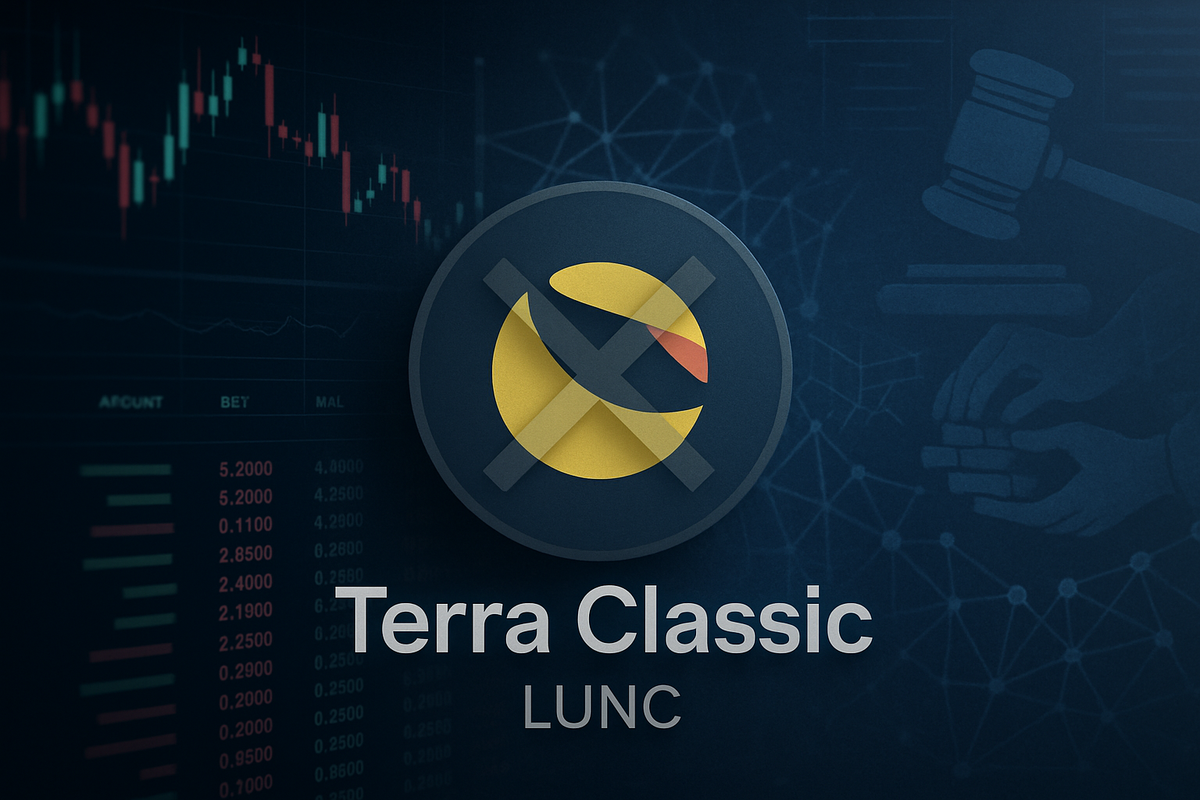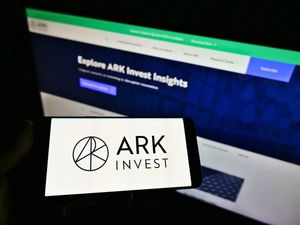
Online brokerage giant eToro has delivered a decisive update to its clients regarding Terra Classic (LUNC) support, announcing a complete cessation of services for the cryptocurrency. Effective November 4, 2025, all remaining LUNC positions on the platform will be automatically closed, with users receiving the equivalent USD value. This move, communicated on September 29, 2025, solidifies eToro's stance after a period of LUNC being designated as a "close-only" asset, a decision initially made in July 2024 and temporarily postponed in August 2025 due to user feedback.
The immediate fallout for LUNC holders on eToro is clear: they must either manually liquidate their positions before the November deadline or face an automatic sale at market price. This development has ignited significant "discontent" and "fury" within the broader LUNC community, which questions eToro's rationale, particularly its reported claim that TerraForm Labs still owns LUNC, a point of contention given the community-driven nature of the Terra Classic chain post-2022 crisis. While potentially introducing downward price pressure, the LUNC ecosystem has shown resilience to similar delisting concerns in the past, suggesting a nuanced market reaction.
eToro's Definitive Stance on LUNC: A Detailed Look
eToro's decision to completely cease support for LUNC stems from a complex web of legal issues surrounding TerraForm Labs (TFL) and the U.S. Securities and Exchange Commission (SEC), coupled with concerns about the stability and ownership of the LUNC network. The platform initially moved both Terra (LUNA) and Terra Classic (LUNC) to a "close-only" status on July 17, 2024, citing "multiple security policy violations and declining stability in the Terra Classic network," alongside developments in TFL's bankruptcy and its substantial $4.5 billion settlement with the SEC. A particularly contentious point for the LUNC community was eToro's alleged claim that TerraForm Labs still "owns" LUNC, an assertion fiercely disputed by the community which believes the chain has been entirely community-driven since the 2022 Terra collapse. This decision directly impacts approximately 78,000 LUNC holders on eToro, who are now unable to purchase the token.
The path to this delisting has been protracted. The saga began with the catastrophic collapse of the original Terra (LUNA) and TerraUSD (UST) in May 2022, leading to the creation of LUNC and an estimated $40 billion in investor losses, after which the LUNC network transitioned to community management. The U.S. SEC then filed a lawsuit against TerraForm Labs and its founder, Do Kwon, in February 2023, alleging multi-billion dollar crypto asset securities fraud. A tentative settlement between TFL and the SEC was reached in May 2024, formalizing a nearly $4.5 billion payment in June 2024. Following this, eToro initiated the "close-only" status for LUNC in July 2024, which triggered widespread outrage from the LUNC community. In September 2024, a U.S. Bankruptcy judge approved TFL's plan to wind down operations, and a court order in October 2024 mandated TFL to burn LUNC tokens as part of the SEC settlement. Most recently, in August 2025, eToro announced a postponement of the full cessation of support until November 4, 2025, maintaining the "close-only" status in response to user feedback.
Key players in this unfolding drama include eToro (NASDAQ: ETOR), the social investment platform making the delisting decision; the LUNC Community, a vocal group of validators, developers, and holders who manage the Terra Classic chain and have expressed strong discontent; TerraForm Labs (TFL), the bankrupt entity whose legal woes and alleged claims of LUNC ownership are central to the issue; and the U.S. Securities and Exchange Commission (SEC), whose lawsuit and settlement with TFL were a primary catalyst. Do Kwon, TFL's founder, also remains a figure in the background. Initial market reactions saw LUNC experience a price drop of 6.2% immediately following the news, trading around $0.00008188, and struggling to regain a $500 million global market capitalization, reflecting fragile market sentiment. However, some reports indicated short-term volatility or a rebound immediately after the initial news. The community's "fury" and "outrage" mirrored a previous incident with Crypto.com (NASDAQ: CRO), which reversed a similar delisting decision after significant backlash, highlighting the strong emotional and financial stakes for LUNC holders.
Corporate Repercussions: Winners and Losers in the LUNC Delisting
eToro's (NASDAQ: ETOR) decision to cease LUNC support, initially moving to a "close-only" status in July 2024 and culminating in a full cessation by November 4, 2025, will undoubtedly impact its own business. While eToro is not a publicly traded company, its operations will experience a direct hit through the loss of LUNC trading volume and associated fees. More critically, it risks user dissatisfaction and potential migration of its clientele to other platforms that continue to support LUNC, leading to a broader loss of customer base and revenue. The "strong discontent" voiced by the LUNC community underscores the potential for a negative impact on eToro's brand perception among certain crypto demographics. For the 78,000 LUNC holders on eToro, the outcome is a forced decision: sell their holdings or transfer them to another platform, facing potential losses if LUNC's price declines due to reduced liquidity and investor confidence.
Conversely, other cryptocurrency exchanges and brokers that maintain LUNC listings stand to potentially gain from eToro's exit. While Binance (privately held) is a dominant player and the most popular exchange for LUNC trading, with a history of significant support including a $3 million investment and a LUNC burn mechanism, it is well-positioned to absorb a substantial portion of the trading volume from migrating eToro users. This could translate to increased transaction fees and market share for Binance in the LUNC ecosystem. Publicly traded exchanges like Coinbase (NASDAQ: COIN) or Robinhood (NASDAQ: HOOD) could also see an influx of users if they were to list LUNC, though these regulated platforms typically exercise caution with tokens facing stability or regulatory issues. Other exchanges such as KuCoin, Kraken, Huobi Global (HTX), MEXC, Gate.io, Bybit, OKX, Pionex, LBank, and Atlantis Pro, if publicly traded, could similarly benefit from this market share shift.
Any publicly traded companies holding significant amounts of LUNC as part of their treasury or investment portfolios could face losses. The delisting by a major platform like eToro can exert downward pressure on LUNC's price due to reduced liquidity and investor confidence, thereby decreasing the value of such holdings. While TerraForm Labs (TFL) is not a public company, its original involvement and the ongoing legal battles have a profound, albeit indirect, impact on the LUNC ecosystem. The overall health and development of the LUNC ecosystem could be negatively affected by reduced accessibility and market confidence, which would indirectly affect any entities still deeply invested in its success, even if they are not directly public companies. The delisting serves as a negative signal for LUNC, potentially deterring new investors and contributing to continued price pressure.
Wider Significance: A Bellwether for the Crypto Market
eToro's definitive decision to delist Terra Classic (LUNC) is far from an isolated incident; it reflects and reinforces several overarching trends within the cryptocurrency industry, particularly as the market matures and faces increasing regulatory pressure leading up to September 29, 2025. This move signifies an accelerating shift towards heightened regulatory compliance, a growing risk aversion among exchanges, and a consolidation of liquidity around more established and compliant assets. The EU's Markets in Crypto-Assets Regulation (MiCA), fully effective by December 30, 2024, has already triggered numerous delistings of non-compliant stablecoins by major exchanges for European users, showcasing a global push for stricter standards. Similarly, the U.S. Securities and Exchange Commission (SEC)'s aggressive enforcement actions, often designating cryptocurrencies as unregistered securities, have prompted platforms like eToro (NASDAQ: ETOR) and Robinhood (NASDAQ: HOOD) to restrict or delist such tokens.
The ripple effects of eToro's delisting extend beyond its own platform. It serves as a strong signal to competitors, many of whom have already taken similar actions. Gemini, for instance, announced plans to delist LUNC by September 20, 2025, and Crypto.com (NASDAQ: CRO) delisted Terra LUNA and LUNA Classic in January 2024. These collective actions indicate a broader industry consensus among centralized exchanges to distance themselves from tokens associated with high volatility, significant regulatory uncertainty, or security breaches, further reducing LUNC's market visibility and liquidity. From a regulatory standpoint, the delisting, primarily driven by the TerraForm Labs bankruptcy proceedings and the Terra vs. SEC lawsuit settlement, highlights the increasing pressure on exchanges to avoid tokens embroiled in legal disputes. It underscores the need for enhanced due diligence and clear ownership structures, especially given the ongoing debate around whether TerraForm Labs still "owns" LUNC despite the community's management.
This situation draws parallels to historical precedents in the crypto space. The original Terra-Luna collapse in May 2022 was a watershed moment, leading to widespread delistings and intensified regulatory scrutiny on algorithmic stablecoins and DeFi. More recently, the XRP delistings from 2020-2023, following the SEC's lawsuit against Ripple (privately held), demonstrated how prolonged legal battles can lead to widespread delistings and how regulatory clarity, when achieved, can reverse these trends. eToro's actions are also consistent with its broader regulatory posture; the company settled with the SEC in September 2024, agreeing to cease trading most crypto assets on its U.S. platform, retaining only Bitcoin (BTC), Bitcoin Cash (BCH), and Ethereum (ETH) within 180 days. This strategic decision to simplify its offerings aligns with a stricter regulatory environment, making the LUNC delisting a logical step in its overarching compliance efforts.
What Comes Next: Navigating a Shifting Crypto Landscape
As of September 29, 2025, the immediate future for LUNC is characterized by lingering price impact and volatility. Following the initial "close-only" status in July 2024, LUNC experienced a price drop, and current technical analysis suggests a bearish sentiment for the token, with predictions of further short-term declines, though some forecasts for late 2025 project slight growth. The LUNC community remains highly active, focusing on technical resilience and economic revival through various proposals, including the v3.5.0 update planned for August 2025 to improve efficiency and security. For eToro (NASDAQ: ETOR), the short-term will involve managing the final phase of LUNC delisting by November 4, 2025, and continuing its strategic pivot towards enhanced regulatory compliance. The platform is aggressively expanding its product offerings, having launched derivatives in Europe and the UK, added over 40 new crypto tokens, and extended trading hours to 24/5 for crypto assets in 2025.
In the long term, LUNC's recovery hinges significantly on the success of its community-driven development, particularly its ongoing token burn initiative, which has already removed billions of tokens from circulation, creating deflationary pressure. The community is also exploring increased utility through integration into new DeFi platforms, staking, and collaborations in NFT and GameFi sectors. Efforts to re-peg USTC, the stablecoin associated with the Terra ecosystem, are considered a "game-changer," with discussions around creating new, fully collateralized stablecoins to restore trust and attract liquidity. Despite the legal shadow cast by Do Kwon and TerraForm Labs (TFL), the LUNC community emphasizes its independence. For eToro, the long-term outlook involves continued product diversification and global expansion, particularly in high-growth regions like Asia. The company's profitability, reporting a $300 million profit in 2025, and expanding global user base provide a strong foundation, though it faces challenges from fierce competition and potential margin pressures.
The broader crypto market in 2025 is characterized by a mix of bullish sentiment, regulatory evolution, and persistent volatility. Experts anticipate the crypto bull run to continue into 2025, potentially reaching new peaks in the first quarter, followed by sharp declines and possibilities for recovery. A surge in Tether dominance as of September 2025 signals a cautious sentiment, with traders moving into stablecoins, potentially indicating a bearish shift if this trend continues. Long-term, the market is poised for increased institutional adoption and mainstream integration, with traditional financial institutions increasingly engaging with crypto. The tokenization of real-world assets (RWAs) is gaining significant traction, attracting global investors and potentially shifting public perception of crypto beyond pure speculation. Technological innovation, particularly the emergence of AI agents in the crypto space, and the growing importance of dApp tokens are also predicted trends. Regulatory consistency and risk management will define structured innovation and strategic growth for the industry, though macroeconomic factors will continue to influence market performance.
Wrap-Up: Navigating the Aftermath and Charting a Path Forward
eToro's decision to transition Terra Classic (LUNC) to a "close-only" status in July 2024, culminating in a full cessation of support by November 4, 2025, marks a pivotal moment for the LUNC community and the broader crypto market. This move, driven by developments in TerraForm Labs (TFL) bankruptcy proceedings, the Terra vs. SEC lawsuit settlement, and concerns over network stability, ignited "fury" and "discontent" among LUNC holders who vehemently dispute any lingering TFL ownership claims. While the initial market reaction saw a price drop for LUNC, the community's swift and vocal response, which reportedly influenced eToro's decision to postpone the full delisting, underscored the resilience and decentralized nature of the Terra Classic ecosystem. The delisting directly impacts approximately 78,000 eToro users, restricting their ability to acquire LUNC on the platform.
Moving forward, as of September 29, 2025, the LUNC market is characterized by a blend of community-driven development, ongoing technical advancements, and external regulatory pressures. The consistent LUNC burning program by Binance (privately held), which has incinerated over 70 billion LUNC, acts as a significant deflationary force. Network upgrades, such as the v3.5.0 update in August 2025, demonstrate strong governance and a commitment to improving efficiency. The liquidation of TerraForm Labs in September 2024 further solidified LUNC's status as a community-governed chain. While technical indicators suggest potential for a short-term rally, long-term price predictions remain highly speculative, contingent on successful burns, positive market sentiment, and ecosystem development. The lasting impact of eToro's action is a mixed bag: it reduces LUNC's accessibility on a major platform, potentially hindering broader adoption, yet it simultaneously highlights the community's remarkable resilience and commitment to self-governance in the face of adversity.
Investors keen on LUNC should meticulously monitor several key areas in the coming months. Firstly, continued significant LUNC burns, particularly from Binance, are crucial for supply reduction. Secondly, observe the success and adoption of further network upgrades and new dApps, as robust development and active governance are vital for long-term viability. Thirdly, watch for further exchange actions; recent news (September 22, 2025) about OKX's upcoming delisting of LUNC and USTC trading pairs suggests that other exchanges may follow suit, impacting liquidity. Fourthly, general cryptocurrency market trends, influenced by macroeconomic factors like U.S. Federal Reserve interest rate decisions, will significantly affect LUNC's price performance. Finally, look for signs of increased utility and adoption for LUNC within its ecosystem or through new partnerships, as real-world use cases could drive demand beyond speculative trading.
This content is intended for informational purposes only and is not financial advice





